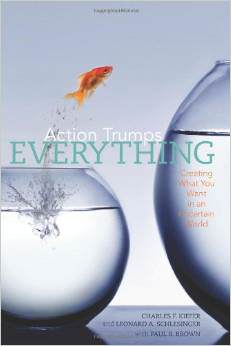10 Reasons to Favor Action vs. Overthinking
I’ve always said that startups are all about execution. Sometimes I encounter self-proclaimed entrepreneurs who have been “thinking” about a concept for many years, and haven’t started yet. Some of these may be visionaries, but none are real entrepreneurs.
Entrepreneurs live by the principles discussed by Leonard A. Schlesinger, President of Babson College, in his book titled “Action Trumps Everything” which he wrote in conjunction with friends Charlie Kiefer and Paul Brown. In it, he explains how the power of entrepreneurial action helps people create what they want in an uncertain world.
One of these principles is that action trumps thinking when the future is unpredictable. This one caught my eye, since the future of everything for startups these days is unpredictable. Here are some of his key reasons that I can relate to on this one:
- You find out what works and what doesn’t. Every startup will tell you that no matter how certain they were of their solution, and the path to success, they had to pivot a few times in the face of unforeseen challenges. Great solutions are never obvious before the fact.
- If you never act, you will never know if you are right or wrong. You may think you know, but you won’t be able to point to anything concrete to prove you are right. The problem with that, as Mark Twain pointed out, is: “It ain’t so much the things we don’t know that get us into trouble. It’s the things we know that just ain’t so.”
- You will find out if you like it or you don’t. Your action, for example, the decision to take steps toward starting a restaurant, may cause you to find out that you love the cooking but hate talking to people, may convince you to go into high-end catering and hire someone to deal with the clients.
- Acting leads to a market reaction, which could take you in another direction. Action leads to evidence, which becomes fodder for new thinking. You act, therefore something changes, and in observing that reaction you gain knowledge that could never have been gained from thinking alone.
- As you act, you can find people to come along with you. For example, in talking to your suppliers, you end up meeting the world’s most organized person. She may soon be a 10% owner running the day-to-day operations of your catering business.
- As you act, you can find ways to do things faster, cheaper, better. You discover, after making your world-famous chicken Parmesan fifty times, that you can prepare the dish in eight steps instead of eleven.
- If you act, you won’t spend the rest of your life wondering “What if…?” If all you ever do is think, you can gain tons of theoretical knowledge, but none from the real world. You become like that woman in the fable who knows the price of everything but the value of nothing.
- If all you do is think, you are less interesting as a person. In other words, if all you ever do is think… all you do is think. Who would you rather sit next to on a plane, someone who started a rock-climbing store, or someone who only thought about it?
- If you act, you learn from other people. You always want to know what’s real. Talking to people is acting… at zero cost. You can learn an awful lot, and it usually doesn’t take much time. Just make sure you act on what you learn.
- Thinking without acting feels like zero cost, but actually may have a huge opportunity cost. From a dollars-and-cents point of view, zero cost may be right. But while you are still thinking, somebody else could be stealing your market or the opportunity itself may end.
But before you act, you should always double check to see that the future is as uncertain as you think. If there is a more than reasonable chance that the future is knowable, you are better off going with a prediction, and that is a good thing.
If there is no way of knowing what the future will be like, act. It is the quickest way to learn. Take one small step toward your goal when it is far away or difficult to accomplish. Then evaluate where you are. A journey of a thousand miles really does begin with a single step.

